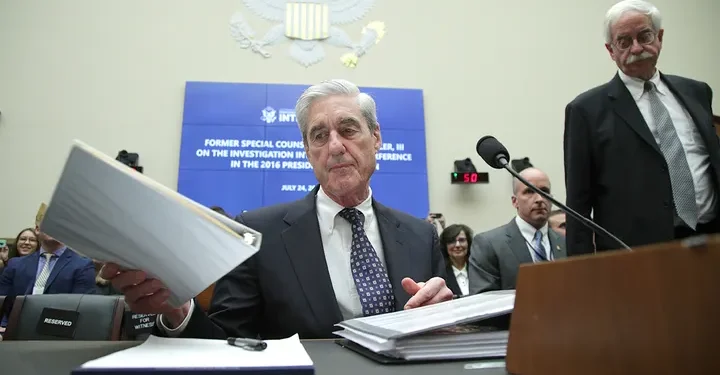Former FBI Director Robert Mueller, once one of the most powerful figures in Washington, has quietly faded from public life. His family revealed to the New York Times that Mueller, now 81, was diagnosed with Parkinson’s disease in 2021.
“Bob was diagnosed with Parkinson’s disease in the summer of 2021. He retired from the practice of law at the end of that year. He taught at his law school alma mater during the fall of both 2021 and 2022, and he retired at the end of 2022,” his family said in a statement, asking that “his privacy be respected.”
It is a striking turn for the man who, for two decades, carried immense influence inside America’s most powerful institutions. Mueller led the FBI from 2001 to 2013, serving under both Republican and Democratic administrations. He became best known, however, as the special counsel tasked with investigating alleged ties between Donald Trump’s 2016 campaign and Russia—a probe that consumed the nation, cost taxpayers tens of millions, and ultimately left more questions than answers.
That investigation produced a sprawling report, but it failed to establish what many in the media and political class had insisted was certain: collusion between Trump’s campaign and the Kremlin. Despite years of breathless coverage, the end result disappointed partisans who had framed it as proof of a conspiracy. Meanwhile, for millions of Americans, it confirmed what they had suspected all along—that Washington insiders had weaponized taxpayer dollars, bureaucracy, and investigative power to weaken a duly elected president.
Mueller’s recent health struggles have also carried political consequences. As reports note, he has been unable to comply with a congressional subpoena regarding the Jeffrey Epstein investigation, citing his decline in speech and mobility. For lawmakers still seeking accountability in that scandal, the former director’s silence is a reminder of how often key figures in Washington avoid scrutiny just as the spotlight begins to turn their way.
The arc of Mueller’s career tells a familiar story: an unelected official wielding immense influence with little direct accountability. From shaping the FBI in the post-9/11 years to overseeing one of the most politically charged investigations in modern history, Mueller became a symbol of Washington’s deep-state culture—where decisions with far-reaching impact on liberty, politics, and taxpayer trust are often made behind closed doors.
Now, with his retirement complete and his voice largely absent, the country is left to assess the legacy of a man whose career shaped two decades of American public life. For many, the question is whether the enormous powers of the federal bureaucracy he once embodied have grown too unchecked.
Mueller’s diagnosis marks the end of his public role, but it does not erase the effects of the institutions he led and the choices he made. In fact, it sharpens a debate conservatives have been raising for years: how to restore accountability, limit bureaucratic overreach, and ensure that no unelected official can steer the nation’s course without the people’s consent.




















